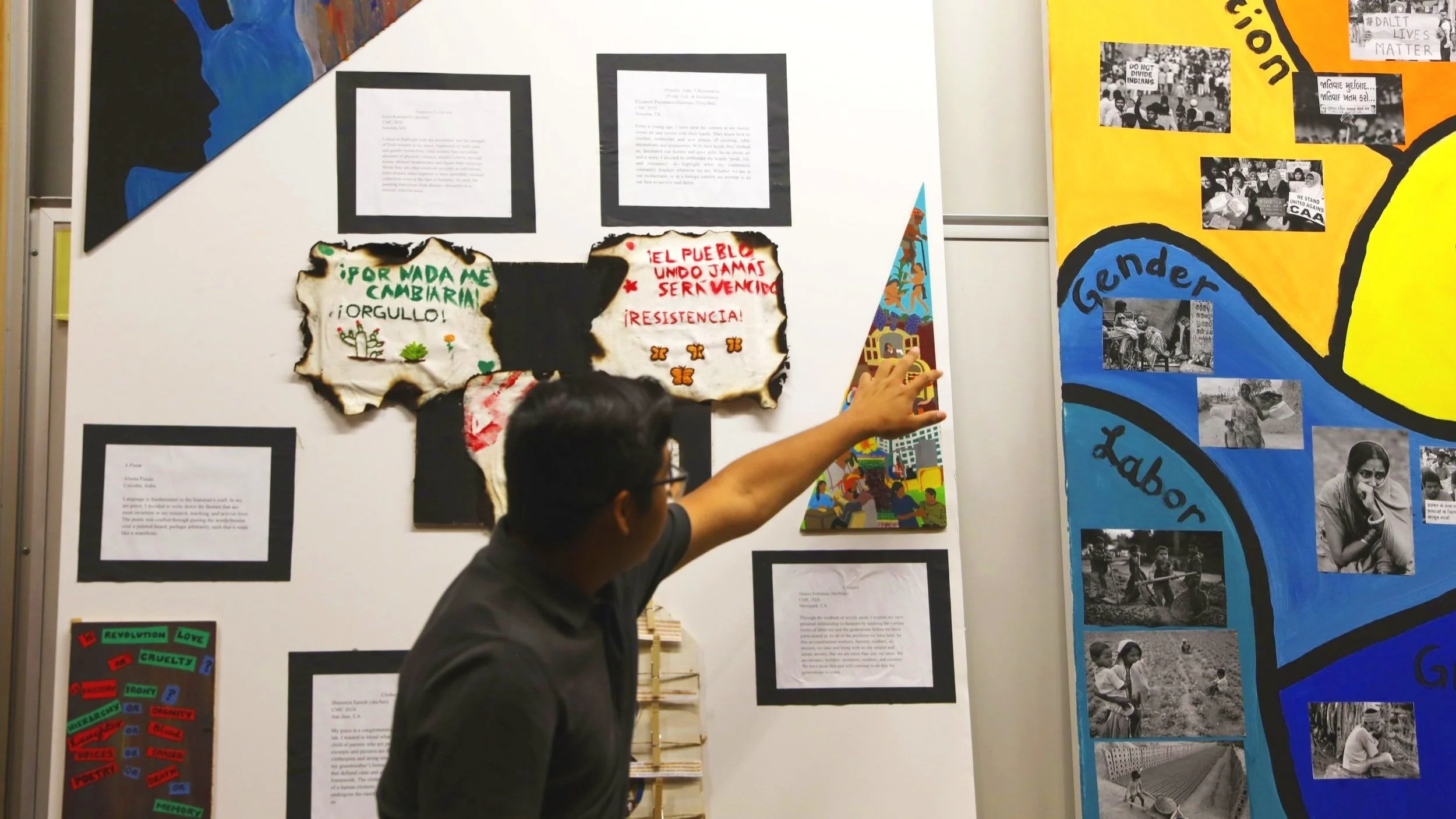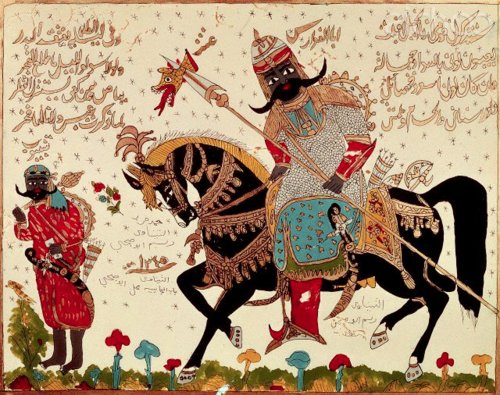2024-2025 Humanities Labs
2023-2024 Humanities Labs
2022-2023 Humanities Labs
RACE AND ISLAM
Professor Heather Ferguson
Stylized image of the warrior-poet ‘Antarah ibn Shaddād.
How have historical developments in AfroEurasia shaped contemporary ideas about race and colorism globally? How do “internal” and “external” perspectives on race and identity differ and what can historical research offer racial, economic, and social justice projects in the contemporary world? This Humanities Lab addresses how the emergence of Islam in the seventh-century Arabian Peninsula re-defined racial, social, and economic hierarchies and generated a new Qur’anic discourse of race and identity that remains a touchstone for self-identified Muslims and an important correction for contemporary, race-based Islamophobia. Students will learn to assess past and present interpretations of this Qur’anic discourse and track how this discourse is mobilized across space and time in distinct cultural and political contexts. We will explore the development of vernacular expressions of meaning and agency across diverse geographies and historical periods: how a high intellectual tradition becomes part of everyday life and pop culture phenomena. Individual projects will expand on our collective work and explore topics such as: the evolution of slavery within and beyond Muslim polities of the 9th to the 18th centuries; the tropes of “blackness” and “whiteness” in literary genres; Muslim reform movements in imperial and neo-imperial contexts; reclamation projects that adopt Islam as a discourse of empowerment (some examples: Haiti, the United States, France); resistance movements to the exclusionary projects of nation-state building; definitions of citizenship; the intersection between race and religion within womanism and feminist movements; and the erasure of Islam from U.S.-based race debates.
Research Assistants
Jacob Detrinidad ‘25
Abhinav Ganesh ‘26
Melanie Kallah ‘25
Mehrin Khan ‘26
Jacob Smagula ‘26
Derik Suria ‘23
Angela Chen ‘24
CASTE, RACE, AND DIASPORA
Professor Ahona Panda
Picture: National Archives UK
In the wake of Isabel Wilkerson’s Caste, many have engaged anew with a long-debated question: to what extent, if at all, can we draw an analogy between caste- and race-based forms of discrimination?
The categories of caste and race both form the basis for systems of stratification and hierarchy marked by brutal legacies of oppression and violence. To that extent, it seems fair to draw an analogy between them to understand how they function. But there are differences, too: whereas caste hierarchy has been seen as an essential, “timeless” structuring element of Indic civilization, racial inequality and violence are deeply implicated in the relatively more recent history of modern capitalism and the transatlantic slave trade. Regardless of the position one ends up taking, what is undeniable is thinkers in the United States and India have been influenced by one another in thinking through the predominant form of inequality in their own worlds. Black American scholars looked to the caste system to carry out early and pioneering work in the analysis of US race relations. In India, Dalits looked to the precedent established by Black resistance in the US to explore their own political possibilities, drawing inspiration from armed resistance as well as the Civil Rights movement.
This Humanities Lab will introduce students to debates on caste and race across disciplines, in order to understand widespread migrations and upheavals that occurred in the wake of empire and colonialism. To pick an example, it is essential to consider both race and caste in considering the history of indentured laborers who moved first from India to the Caribbean, only to migrate once more to the United States. Thinking of a global history of caste necessitates turning to myriad forms of inequality that have historically been shaped and transformed by forces such as religion, labor, slavery, and colonial capitalism, and which have existed alongside liberal discourses of universal rights and individual freedoms. Readings and workshops will encompass the following themes:
Caste in Hinduism
The ways religious missionaries and the colonial state defined caste in nineteenth- and twentieth-century British India
How caste became a term with which to rethink race relations in a formative moment for American sociology in the early twentieth century
The histories of indentured labor in the Americas
The parallels between protest and resistance in Dalit and Black American communities
Civil rights movements and legal/constitutional reform in India and the US
The legacies of caste-based discrimination that persist in diasporic communities.
Research Assistants
Riya Bhasin ‘26
Bingxi Cai ‘26
Tom Inouye ‘26
Enya Kamadolli ‘26
Ivanna Morales Mercado ‘25
Elizabeth Palomares-Guzman ‘25
Meghna Pamula ‘25
Daniel Penaloza ‘26
Shay Suresh ‘24
2021 - 2022 Humanities Labs
Humanizing Artificial intelligence
Professor Gabbrielle Johnson
In the age of technology, we rely on algorithms to make daily decisions about nearly every aspect of human life, including criminal sentencing, loans, policing, credit card applications, job recruiting, and medical care. However, there is little ethical oversight of AI’s increasing hold on our lives, yielding morally disastrous results. Machine learning programs “learn” by discovering and mimicking patterns in data. But in our imperfect world—shaped in part by ignorance and injustice—some patterns are pernicious. Biases of AI are inherently intertwined with, and manifest as the mere automated extension of, the biases in the minds of human individuals. As a result, biases that society has long struggled with persist, but now they operate under the innocent guise of objectivity. Toward addressing the difficult ethical challenges facing the deployment of AI, students in this lab will endeavor to understand foundational conceptual issues regarding what biases are, from where they originate, how they’re identified, and ultimately, how to eliminate them. This Humanities Lab will study in-depth the conceptual foundations of the existence of algorithmic bias and its relationship to human and societal bias. It will apply that theoretical understanding in the service of humanizing artificial intelligence and creating more ethical applications of social technology.
global Coffee cultures
Professor Jamel Velji
Coffee is the beloved brew that awakens the senses of millions around the world every day. Yet few people are aware of coffee’s complex histories, or how coffee is represented in its travels from farm to cup. This Humanities Lab takes a multidisciplinary approach to coffee. It examines coffee’s origins, history, and global supply chains, and asks questions about how coffee is represented in art, in advertising, and in popular culture. In our explorations, we’ll learn about coffee’s role in major world events—from enslavement to the Enlightenment, from wars to US policy on international development. Our foray into coffee will also allow us to explore global patterns of cultural, economic and religious exchange, while thinking through how coffee can serve as a potent symbol for religious and cultural expression.
2020 - 2021 Humanities Labs
Spiritual Impulse of the Black, Latinx, and Native American Civil Rights Movements
Professor Gaston Espinosa
This lab explores the spiritual impulse of the Black, Mexican American, and American Indian civil rights struggles from the 1950s-1970s and then their influence on modern struggles today from Ferguson to Latino immigration reform to Standing Rock to Minneapolis.
Despite the critical role that religion played, the movement and leaders have largely been stripped of their spiritual expressions and contributions by society. However, a reading of the writings by civil rights leaders and a review of documentaries and interviews from the period make it clear that spirituality (indigenous, popular, and non-institutional forms) played a decisive role in shaping their understanding and moral visions of racial equality and how to build a more just society.
Legends, Lies, and Us
Professor Briana Toole
The moment that Brandon Stark discovers that Robert’s Rebellion is a lie - that its origin was not to free the people of Westeros from an oppressive king but to vindicate a lover scorned – we share in his sense of disorientation. It calls into question everything we have come to know in the Game of Thrones universe - who we think of as the hero or villain, who deserves redemption, who ought, at the end, sit on the Iron Throne.
The stories that we tell matter. They shape who we are and remind us of where we have been. They offer a direction for the future. Stories shape and guide us, they help us understand ourselves and our relationships to others. They offer values to live by and fight for. But, what happens when we learn that those stories are lies?
We’ll examine the role of myths, legends, and folklore in the construction of the self and the communities we exist in, as well as how we grapple with the realization that those stories may tell untruths. Moreover, we’ll explore the relationship between myth, propaganda, and ideology to evaluate how these become part of the story we tell ourselves about ourselves. And, we’ll explore how these stories can be reimagined as tools of resistance.
Covid19@CMC
Professor Lily Geismer and Professor Tamara Venit-Shelton
Covid19@CMC is a digital archive of interviews and images that reflect the lived experience of the Covid-19 pandemic among the CMC community broadly defined. The archive will be housed in Special Collections and the Claremont Colleges Library and made accessible to the public. By these means, it will provide a space where our community can express their understandings, hopes, and fears about the pandemic as well as where future researchers, policy makers, activists and artists can reflect on the current crisis and its lessons. In Summer 2020, a team of CMC students launched the interview and collection process, and this lab will build and expand on their work. Students selected for this lab will be trained to conduct oral histories and work with archival and exhibition software. They will prepare supplementary materials for researchers, write their own reflections on the process for the project website, and gather images that capture the lived experience of the pandemic and CMC’s response to it.
2019 - 2020 Humanities Labs
Great Expectations
Professor Rima Basu
Professor Rima Basu and students in the Great Expectations Humanities Lab.
When Mulan reflects on how she'll never be the perfect bride or the perfect daughter, we recognize that pain. We are surrounded, constantly, by other people's expectations of how we should behave and who we should be. On the one hand, it seems we have to make assumptions about others. For example, the social sciences rely on statistical analyses of classes of people. On the other hand, we recognize that pain Mulan identifies when we’re reduced to who we are expected to be because of protected characteristics that are outside of our control rather than who we in fact are. Together we'll meet and discuss various academic texts, books, and films about expectations, stereotyping, and the assumptions we make about others so that all participants have a common foundation from which to build their own individual and/or collaborative projects.
Imagining Los Angeles
Professor Kevin Moffett
Professor Andrew Moffett and students in the Imagining Los Angeles Humanities Lab.
Imagining Los Angeles will offer students a chance to think critically and creatively about Los Angeles as a place, a factory for its own myth-making, a compelling intersection of cultures, a harbinger of the future. We’ll read some of the literature set there, watch a few of the many films with the city as a backdrop, and explore it as a group with an eye toward narrowing your research to a person, a neighborhood, an idea, all the while speculating on the future of Los Angeles and imagining creative solutions to current problems. Your research will culminate in a creative project, the scope, structure, and format of which will be up to you. Collaboration will be encouraged, as well as novel forms: short films, podcasts, photo-essays. The nature of the lab will be experimental and will ideally give you a chance to approach your interests and obsessions in ways you’ve not yet had a chance to.










